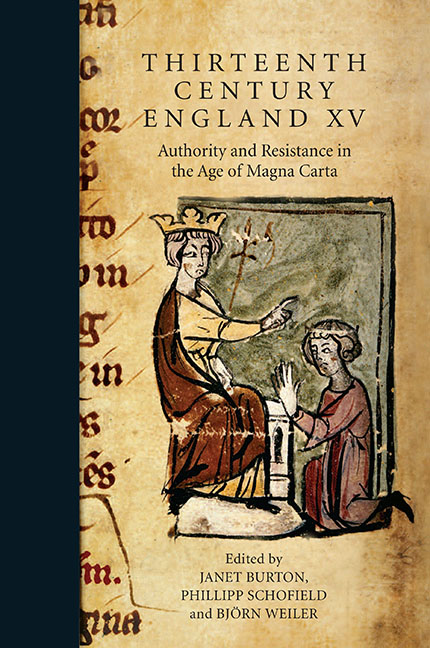 Thirteenth Century England XV
Thirteenth Century England XV Natural law, Protest and the English Episcopate 1257–1265
Published online by Cambridge University Press: 11 June 2021
Summary
‘Although according to holy scripture and canon law the power of the Church and the priesthood should be greater than all secular power, and the inferior should not judge the superior but vice versa, the lord king … against divine and natural law turns the head to the tail.’ This was the basis of complaints by the English bishops of 1253 against the king, Henry III. It is with episcopal attempts to restore balance within the kingdom as they saw it during the period 1258–1265 that this paper is concerned. The bishops’ use of the concept and language of natural law – the underpinning rules by which the universe was governed and by which men should administer their own affairs, against which all man-made law should be tested – gives an insight into the involvement of particular English bishops with the secular rebellion. Walter de Cantilupe of Worcester, Henry of Sandwich at London, Stephen Bersted at Chichester and Richard Gravesend at Lincoln, all followed, from 1263, a high-risk policy of actively supporting the rebellious barons.
Like all thirteenth-century English bishops, these men exercised a mixture of secular and ecclesiastical authority. They were spiritual lords who obeyed God and the papacy and temporal lords who owed allegiance to the king. They cared for the souls of their parishioners and for the income of their lands. They looked both to their own salvation and to their own careers. And in 1263 they took both spiritual and worldly risks when they gave active support to a secular rebellion which was opposed by the papacy and where failure was likely to lead to their excommunication and suspension, in a situation where they could not claim that they did not know what the consequences of their actions would be. Ignoring episcopal experience of an earlier phase of the rebellion – the lesson of which was that their very real concerns were only marginal to the aims of the leading rebels – they abandoned the episcopal policy of 1258 to 1261, which had held back from direct involvement with the secular protests, and became actively involved in de Montfort's campaign.
Explanations have been offered for the bishops’ involvement. It has been said that they had no real practical or theoretical commitment to the baronial programme, but became involved only to obtain and maintain peace in the kingdom.
- Type
- Chapter
- Information
- Thirteenth Century England XVAuthority and Resistance in the Age of Magna Carta. Proceedings of the Aberystwyth and Lampeter Conference, 2013, pp. 83 - 98Publisher: Boydell & BrewerPrint publication year: 2015


